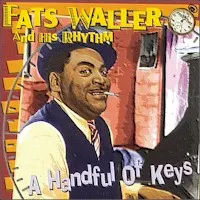Time: 69:56
Size: 160.1 MB
Styles: Stride, Early jazz, Piano jazz
Year: 1998
Art: Front
[3:19] 1. Original E-Flat Blues
[3:30] 2. Stayin' At Home
[2:47] 3. Hey! Stop Kissin' My Sister
[2:54] 4. Everybody Loves My Baby
[3:14] 5. I'm Gonna Salt Away Some Sugar
[2:57] 6. T'aint Nobody's Bizness If I Do
[3:22] 7. Abercrombie Had A Zombie
[2:39] 8. Blue Eyes
[2:39] 9. Scram!
[2:27] 10. My Melancholy Baby
[2:39] 11. Mamacita
[3:01] 12. Liver Lip Jones
[3:27] 13. Buckin' The Dice
[3:01] 14. Pantin' In The Panther Room
[3:09] 15. Come Down To Earth, My Angel
[2:40] 16. Shortnin' Bread
[3:24] 17. I Repent
[3:15] 18. Do You Have To Go
[2:59] 19. Pan-Pan
[3:16] 20. I Wanna Hear Swing Songs
[3:25] 21. You're Gonna Be Sorry
[2:43] 22. All That Meat And No Potatoes
[2:57] 23. Let's Get Away From It All
Just a few days short of his 37th birthday, Thomas "Fats" Waller recorded five outstanding piano solos. These would turn out to be the last unaccompanied studio piano records of his career, with the exception of those somewhat alcohol-driven V-Disc platters from September of 1943. The 1941 Victor solos are studies in immaculate ease. The artist's choices are fascinating: two pleasantly reflective Hoagy Carmichael reveries, James P. Johnson's throw-down showpiece the "Carolina Shout," a delicate rendering of Duke Ellington's "Ring Dem Bells" and the ultimate interpretation of Waller's own "Honeysuckle Rose." The original 78rpm label bore the distinctive subtitle: "à la Bach-Beethoven-Brahms-Waller." Classics (1068) would be worth having just for the piano solos, even if it didn't convey all the excitement of Waller's small and large band recordings from this very transitional year. "Twenty Four Robbers" is particularly funny, and "Sad Sap Sucker" is an example of the kind of song Waller wrote in collaboration with his manager Ed Kirkeby. They also came up with several saucy numbers that Fats would record with his big band in Los Angeles during the summer of '41. The "Rump Steak Serenade" is an over-the-top paean to red meat, resounding with Waller's refrain: "let me stick my fork in the gravy!" The boisterous "Come and Get It" has more than vaguely sexual overtones, but "Ain't Nothing to It," which posed the question "Gettin' much lately?" was considered too near the bone and remained unissued until many years after Waller's demise. "Chant of the Groove" has a shouted scat intro by the pianist. Interestingly, his first two syllables come out as "be bop," but this is straightforward big band swing. The small group session of October 1, 1941 is most notable for Al Casey's guitar work on "Buck Jumpin'," Gene Sedric and John "Bugs" Hamilton's lively interplay in front of Waller's bubbly Hammond organ on "Clarinet Marmalade" and a lovely understated opus inspired by "The Bells of San Raquel." While "That Gets It, Mr. Joe" is rowdier, and the more-than-somewhat misogynistic "Bessie, Bessie, Bessie" is much saltier, "San Raquel" allows Waller to reveal the quieter side of his personality. For this reason the song never makes it on to any Waller "Best Of" collections. Be grateful that we have the Classics chronological series, for this is the only way to truly get to know someone who was so complex. "Winter Weather" is another heartwarming example of that marvelous creature, the relaxed Fats Waller. "Cash for Your Trash," an entire song devoted to the subject of metal recycling, was his first contribution to the war effort. By December 1943 he had literally worked himself to death by entertaining troops at all hours and selling U.S. bonds on the air. These 1941 sides could be considered the first of what would be his last studio recordings. ~arwulf arwulf
The Chronological Fats Waller 1940-1941



